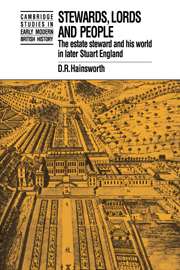Book contents
- Frontmatter
- Contents
- Preface
- List of abbreviations
- Introduction
- The rise of the estate steward
- The steward's career
- The whole duty of a steward
- Between lord and tenant
- Returns to London
- The ambassador
- Tending the interest
- The almoner
- Filling the pulpit
- The constable: defending the manor
- The constable: defending the forests
- Exploiting the estate
- The clerk of works
- Master and man
- A note on the manuscript sources
- Index
- Title in the series
Between lord and tenant
Published online by Cambridge University Press: 05 December 2011
- Frontmatter
- Contents
- Preface
- List of abbreviations
- Introduction
- The rise of the estate steward
- The steward's career
- The whole duty of a steward
- Between lord and tenant
- Returns to London
- The ambassador
- Tending the interest
- The almoner
- Filling the pulpit
- The constable: defending the manor
- The constable: defending the forests
- Exploiting the estate
- The clerk of works
- Master and man
- A note on the manuscript sources
- Index
- Title in the series
Summary
Gentlemen must be kind and abate rents and give leave to plough or else it will be worse for landlord and tenant.
Francis Guybon, 1708I assure you, my lord, several tenants in these parts keep landlords in a kind of awe for fear they should throw up their land, so the world is thrown upside down since I knew Croxall.
Charles Agard, 1674Such ungrateful people as these no persons can oblige for condescensions whet their litigious appetites, never to be satisfied or quieted until they fall into their primitive dust.
Thomas Tickell, 1677However varied a steward's duties and functions might be his chief concerns, his day-to-day tasks, related to his master's tenants and to those parts of the master's estate which they rented or leased. These properties were predominantly farms but could also be additional pastures, rabbit warrens, fishing rights, houses, or such industrial undertakings as flour or fulling mills, mines or quarries. Everything that the steward did, every action performed, every policy pursued or solution devised, should ideally have helped to secure one fundamental objective: the prosperity of the estate and thereby of his master, his family and his posterity. The surest way to achieve this was by promoting harmony between landlord and tenant, playing a mediating role. To have a disaffected tenantry, involved in outright confrontation and full of bitterness and hostility toward the landlord, could only obstruct his achieving that objective.
- Type
- Chapter
- Information
- Stewards, Lords and PeopleThe Estate Steward and his World in Later Stuart England, pp. 48 - 74Publisher: Cambridge University PressPrint publication year: 1992



